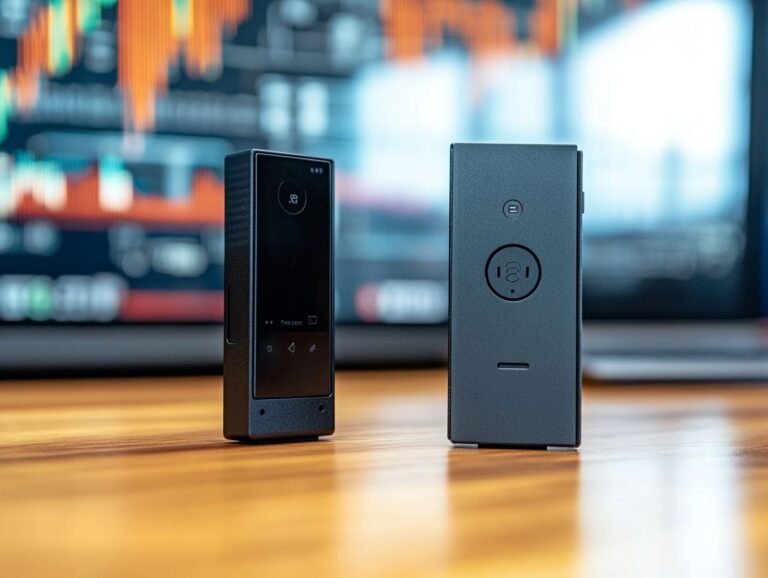Best Crypto Cold Wallets for Secure Bitcoin Storage
In the ever-evolving world of cryptocurrency, safeguarding your assets is paramount, especially for Bitcoin long-term holders. This article explores the best crypto wallets, including Coinbase Wallet and hardware options, essential tools designed to provide secure storage solutions that keep your digital currency safe from cyber threats.
We break down what cold wallets are, their advantages, and how to select the right one for your needs. From top recommendations to setup tips and common concerns, you’ll find everything you need to make an informed decision.
Key Takeaways:
What is a Cold Wallet?
A cold wallet represents a sophisticated approach to cryptocurrency storage, designed to keep private keys securely offline. This non-custodial solution offers a significant advantage by minimising the risk of hacking and unauthorised access, making it particularly suitable for long-term holders of digital assets like Bitcoin and Ethereum. Additionally, cold storage solutions like Trezor and Ledger provide enhanced crypto protection for the crypto community.
Such secure storage options are essential for safeguarding one’s digital investments, especially when contrasted with hot wallets that remain connected to the internet and are thus more susceptible to cyber threats and issues like trading fees and transaction fees.
Among the various types of cold wallets, hardware wallets have emerged as a favoured choice, providing an additional layer of security through physical devices engineered specifically for this purpose. Users value the robust protection these wallets offer, often enhanced with encrypted storage and backup capabilities.
In contrast to online storage alternatives, cold wallets enable individuals to retain full control over their private keys, instilling a sense of security and confidence within the cryptocurrency community.
Advantages of Using a Cold Wallet
The use of a cold wallet offers numerous advantages, particularly for individuals dedicated to safeguarding their cryptocurrency investments over the long term.
Cold wallets provide exceptional protection against malware attacks and unauthorised access, ensuring that private keys remain secure and offline. This heightened security is essential for users who maintain substantial trading balances in cryptocurrencies such as Bitcoin and Ethereum, granting them peace of mind during their crypto transactions.
How to Choose the Best Cold Wallet
Selecting the ideal cold wallet for safeguarding Bitcoin and other cryptocurrency assets entails a careful evaluation of several pivotal factors that can profoundly influence both user experience and security.
Key considerations include the wallet’s compatibility with a range of cryptocurrencies, essential security features such as multi-factor authentication and PIN codes, and the esteemed reputation of manufacturers like Ledger and Trezor. Each of these elements plays a critical role in guiding users towards a well-informed choice.
Key Features to Look For
When evaluating cold wallets, it is essential to identify key features that enhance both security and usability, particularly for long-term Bitcoin storage. One should look for hardware wallets that provide robust security measures such as cold storage, user-friendly interfaces, and compatibility with various cryptocurrencies, ensuring that digital assets remain both protected and easily accessible.
A crucial aspect to consider is the wallet firmware, which must be regularly updated to mitigate any vulnerabilities. Reliable recovery options, such as seed phrases, play a pivotal role in safeguarding access to funds. When the device is lost or damaged, these phrases enable users to restore their assets seamlessly. Features such as two-factor authentication and encrypted backups further strengthen security levels.
Collectively, these enhancements not only improve the overall performance of cold wallets but also significantly bolster their efficacy in protecting sensitive crypto investments against potential threats.
Security Considerations
Security considerations stand at the forefront when selecting a cold wallet, as the safeguarding of Bitcoin and Ethereum investments relies heavily on various features designed to mitigate potential risks. Essential security attributes encompass malware protection, multi-factor authentication, and support for secure recovery methods, all aimed at preserving cryptocurrency from various threats.
Investors should also weigh the implementation of hardware-based encryption alongside the use of tiered security hierarchies. Hardware wallets, such as Trezor and Ledger, employ advanced cryptographic algorithms to protect private keys, ensuring that even when connected to a compromised computer, those keys remain secure.
Community feedback consistently underscores the reliability of these devices, with numerous users praising their robust security measures. The inclusion of multi-signature support emerges as another critical feature, requiring multiple approvals for transactions, thereby minimising the risk of unauthorised access.
Ultimately, a well-rounded cold wallet seamlessly integrates these components, addressing user concerns regarding theft, hacking, and loss.
Top Cold Wallets for Bitcoin Storage
The market presents an array of premier cold wallets meticulously engineered for secure Bitcoin storage, addressing diverse user needs and preferences. These wallets often feature advanced security measures, including multi-factor authentication and wallet firmware updates, to ensure the highest level of crypto security.
Noteworthy among these are hardware wallets such as the Ledger Nano S Plus and Trezor Model T, distinguished by their formidable security features, intuitive user interfaces, and compatibility with a broad spectrum of cryptocurrencies.
Best Hardware Cold Wallet: Ledger Nano S Plus
The Ledger Nano S Plus is widely recognised as one of the premier hardware cold wallets, thanks to its sophisticated security features and intuitive design. This wallet offers secure cold storage for Bitcoin, Ethereum, and various other crypto assets while ensuring a straightforward approach to managing cryptocurrency transactions within the crypto market.
Equipped with robust security measures, including secure chip technology and a dependable PIN code, users can rest assured that their digital currencies are safeguarded. Its sleek, compact design enhances portability and ease of use, allowing for seamless access whenever needed.
Additionally, the wallet’s compatibility with a broad spectrum of cryptocurrencies enables users to manage diverse portfolios in one convenient location. User reviews consistently emphasise the intuitive interface, while experts commend its reliability, solidifying its status as a favoured option for both newcomers and seasoned crypto enthusiasts alike.
Ultimately, the Ledger Nano S Plus strikes an impressive balance between security and usability.
Best Portable Cold Wallet: Ledger Nano X
For those in search of a portable solution, the Ledger Nano X emerges as the premier choice for a cold wallet, expertly blending robust security features with Bluetooth connectivity for effortless usability. This wallet enables users to securely manage their Bitcoin and Ethereum assets while on the move, positioning it as an exceptional option for cryptocurrency trading enthusiasts and those engaged in decentralized exchanges like Uniswap and Sushiswap.
Its compact design facilitates easy portability, making it perfect for individuals who prioritize mobility. The advanced Bluetooth capabilities enable seamless fund transfers directly from a smartphone or tablet, setting it apart from many other portable wallets that lack this functionality.
Users consistently commend its intuitive interface and stringent security measures, which include a fortified chip and a secure element, ensuring that assets remain safeguarded. In comparison to alternatives such as Trezor, the Ledger Nano X provides enhanced compatibility with a variety of cryptocurrencies, rendering it a versatile choice for diverse investment portfolios.
Best All-in-One Cold Wallet: SafePal
The SafePal wallet stands out as the premier all-in-one cold wallet, providing multi-currency support and an exceptional user experience that appeals to both newcomers and seasoned crypto investors alike. With its seamless integration and robust security features, including wallet compatibility with various altcoins and crypto solutions like staking coins, SafePal ensures that managing digital assets remains both secure and straightforward.
One of its most notable attributes is the extensive array of supported cryptocurrencies, allowing users to store everything from Bitcoin to emerging altcoins all in one place. This versatility is particularly attractive to those who desire a diverse portfolio without the hassle of juggling multiple wallets.
The user interface is designed to be intuitive and visually engaging, facilitating effortless navigation, even for those who are just entering the crypto realm.
On the security front, SafePal utilises advanced encryption technologies and offers features such as biometric access and recovery phrases, providing users with invaluable peace of mind. Additionally, its compatibility with popular crypto wallets like Coinbase Wallet enhances its appeal. This combination of functionality and ease of use positions SafePal at a distinct advantage in the increasingly crowded market of cryptocurrency wallets.
Best Budget Cold Wallet: KeepKey
For budget-conscious users, the KeepKey wallet emerges as the premier choice for an economical cold wallet, delivering essential security features without breaking the bank. Despite its modest price, KeepKey offers reliable cold storage for Bitcoin and other crypto assets, allowing users to safeguard their assets without overspending.
Its sleek design and user-friendly interface render it an attractive option for both novices and experienced investors alike. The wallet boasts robust security measures, including PIN protection and a recovery seed, effectively shielding assets from theft and loss. Additionally, its hardware crypto wallet nature ensures malware protection.
When compared to other budget-friendly wallets, KeepKey distinguishes itself through a harmonious blend of three critical elements: affordability, intuitive usability, and solid security protocols. This makes it an invaluable option for anyone seeking to securely store their digital assets without straining their finances, especially in contrast to alternatives that may present fewer features at a comparable price.
Best for Enhanced Security: Ellipal Titan
The Ellipal Titan is esteemed for its superior security, operating as an air-gapped wallet that entirely segregates private keys from online access. This distinctive feature positions it as the ideal choice for those who prioritize security and are committed to safeguarding their cryptocurrency investments. It stands out among hardware wallets for its unique approach.
By employing QR codes for transactions rather than relying on USB or Bluetooth connections, this wallet effectively mitigates potential cyber threats. Users praise its intuitive interface, which facilitates the seamless management of numerous cryptocurrencies, including Bitcoin, Ethereum, and others. Its wallet features include compatibility with various crypto exchanges and decentralized exchanges like Uniswap.
Feedback consistently praises its robust construction and user-friendly setup, making it accessible even for individuals new to the realm of digital assets. In the landscape of high-security wallets, the Ellipal Titan distinguishes itself through its blend of portability, advanced security features, and versatility in accommodating a wide range of currencies, including support for staking coins, solidifying its status as a preferred choice among cryptocurrency enthusiasts.
Setting Up Your Cold Wallet
Setting up a cold wallet correctly is paramount for safeguarding Bitcoin and other cryptocurrencies. Adhering to a comprehensive step-by-step guide can significantly simplify this process and enhance your crypto security.
This guide meticulously outlines the essential setup procedures, including initialising the wallet, crafting a secure seed phrase, and implementing advanced security measures to enhance the cryptocurrency storage process.
Step-by-Step Setup Guide
“`html
The setup process for a cold wallet begins with a fundamental yet critical step: creating a secure seed phrase that acts as the key to one’s cryptocurrency assets. This step is of utmost importance, as the loss of the seed phrase can lead to a permanent forfeiture of access to Bitcoin and Ethereum holdings. For more information, check out the Best Crypto Cold Wallets for Secure Bitcoin Storage, including reviews of popular options like Ledger and Trezor Model T.
“`
Once the seed phrase is generated, it is essential to write it down on a physical medium, such as paper, and store it in a secure location, protected from potential threats like fire or water damage. Caution must be exercised regarding digital storage options, as they are vulnerable to hacking. Consider using non-custodial wallets for added security control.
Following this, it is imperative to regularly update the wallet’s firmware to incorporate the latest security features, thereby safeguarding against vulnerabilities and ensuring compatibility with the crypto market advancements.
Familiarity with the wallet’s interface and settings enhances overall security and usability, transforming the cold wallet from a source of anxiety into a manageable tool for cryptocurrency management.
Tips for Secure Usage
Utilising a cold wallet securely necessitates adherence to best practices that effectively mitigate the risks associated with cryptocurrency transactions and malware threats. By implementing strategies such as regularly updating wallet firmware, employing multi-factor authentication, and ensuring the wallet is stored in a secure location, individuals can significantly enhance the protection of their digital assets.
It is imperative to create and securely back up the wallet’s seed phrase, as this phrase serves as the key to restoring access to one’s assets in the event of loss or theft. Opting for hardware wallets that incorporate biometric security features can also provide an additional layer of protection against unauthorised access.
Regularly scanning computers and devices for malware using reliable antivirus software remains a pivotal step in ensuring that the cold wallet is safeguarded from potential threats. Additionally, maintaining vigilance against phishing scams can avert inadvertent disclosures of sensitive information, thereby fortifying the security of one’s investments.
Common Concerns and FAQs
Addressing prevalent concerns and frequently asked questions regarding cold wallets can substantially bolster user confidence in utilising these secure storage solutions for Bitcoin and other cryptocurrencies.
This section aims to dispel myths and offer valuable insights into the safety, usability, and efficiency of cold wallets within the dynamic landscape of the crypto market.
Are Cold Wallets Safe?
The safety of cold wallets is a prevalent concern among cryptocurrency holders, with the level of security largely contingent upon the implementation of their protective features. In general, cold wallets are deemed significantly safer than hot wallets, offering robust safeguards against malware attacks and unauthorised access.
These wallets typically incorporate a variety of security measures, including encryption and offline storage, which considerably mitigate the risk of cyber threats. For instance, cold wallets, such as hardware devices or paper wallets, store private keys in an offline environment, rendering it nearly impossible for hackers to breach them remotely. In stark contrast, hot wallets—commonly found on exchanges or mobile applications—remain perpetually connected to the internet, exposing them to a plethora of vulnerabilities.
By employing features like multi-factor authentication and secure PIN codes, cold wallets further bolster their defences, ensuring that only the rightful owner can access their funds with minimal risk of compromise.
What Happens if I Lose My Cold Wallet?
Losing a cold wallet can indeed be a daunting experience, but a clear understanding of the recovery process can significantly alleviate the associated anxiety. For those who have securely stored their seed phrases and private keys, regaining access to cryptocurrency assets is still possible, even in the event of a lost physical wallet.
It is essential to treat seed phrases and private keys with the utmost diligence, as they serve as the keys to one’s digital treasure. The recovery journey begins with locating the backup phrases that were meticulously noted during the wallet setup; these phrases act as the gateway back into the realm of cryptocurrency. Should both the wallet and these critical components be misplaced, the likelihood of recovery diminishes considerably. Using wallets like Ledger or Trezor can simplify this process.
As a best practice, it is advisable to utilise a secure physical location, such as a safe, for the storage of these vital details. For enhanced future protection, one might explore options like encrypted digital vaults, ensuring that sensitive information remains both safeguarded and accessible when needed. Additionally, consider the user experience when selecting a platform for storage.
How Do Cold Wallets Compare to Hot Wallets?
Cold wallets and hot wallets fulfil distinct roles within the realm of cryptocurrency storage, each presenting its own unique advantages and disadvantages. Cold wallets are celebrated for their heightened security features, making them ideal for long-term storage, while hot wallets excel in providing convenience for frequent transactions, positioning them as the preferred choice for everyday use.
Grasping the nuances between these two types of wallets can profoundly influence how individuals manage their digital assets. Cold wallets focus on security through offline storage methods, which render them resistant to hacking and online threats; however, this heightened security comes at the expense of immediate accessibility. Conversely, hot wallets maintain an internet connection, enabling users to effortlessly send and receive funds, but this convenience introduces a greater risk of vulnerability.
Thus, adopting a balanced approach may prove most prudent—allocating the majority of funds to a cold wallet for enhanced security, while employing a hot wallet for daily transactions. This strategy strikes an optimal balance between safety and convenience, ensuring a well-rounded management of digital assets. Consider options from companies like SatoshiLabs and ShapeShift for diverse crypto solutions.
Frequently Asked Questions (FAQs)
What are cold wallets and why are they important for secure Bitcoin storage?
Cold wallets, also known as hardware wallets, are physical devices used to store cryptocurrency offline, providing an extra layer of security as they are not connected to the internet. They are important for secure Bitcoin storage because they protect your digital assets from potential hacking attacks and other online threats like malware.
What are the best crypto cold wallets for secure Bitcoin storage?
Some of the best crypto cold wallets for secure Bitcoin storage include Ledger Nano X, Trezor Model T, and KeepKey. These wallets offer advanced security features such as seed phrase backup, multi-signature support, multi-factor authentication, and hardware encryption, making them ideal for long-term holders of Bitcoin and other digital assets like Ethereum.
Can I use a hot wallet for secure Bitcoin storage?
While hot wallets, such as Coinbase Wallet, may offer convenient access to your Bitcoin, they are not recommended for long-term and secure storage. This is because they are connected to the internet, making them vulnerable to cyber attacks. It is best to use a cold wallet for secure Bitcoin storage and to ensure better crypto protection.
How do I transfer my Bitcoin to a cold wallet?
To transfer your Bitcoin to a cold wallet, you will need to generate a receiving address from your cold wallet and then send your Bitcoin from your crypto exchange (such as Coinbase) or other hot wallet to this address. The process may vary slightly depending on the type of cold wallet you are using, so be sure to follow the instructions provided by the wallet manufacturer. Always check for wallet compatibility with your crypto assets before proceeding.
What happens if I lose my cold wallet?
If you lose your cold wallet, you can restore your funds by using the seed phrase backup. This is a series of words that you receive when setting up your cold wallet and acts as a backup for your private keys. It is also recommended to use multi-factor authentication for additional security. It is important to keep your seed phrase in a safe and secure location to prevent anyone else from accessing it.
Are cold wallets compatible with all cryptocurrencies?
No, not all cold wallets are compatible with every cryptocurrency. When choosing a hardware crypto wallet for secure Bitcoin storage, make sure to check if it supports Bitcoin and any other cryptocurrencies you may want to store, such as Ethereum. Some wallets may also offer compatibility with a wider range of cryptocurrencies, making them more versatile for long-term holders. Always review the wallet features and security measures before making a decision.





